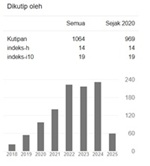EFEKTIVITAS MODEL PEMBELAJARAN TWO STAY TWO STRAY PADA MATERI BILANGAN BERPANGKAT DI SMP AL-WASILAH
Abstract
This study aims to determine the ability of teachers to manage learning, student responses, student learning completeness with the two stay two stray learning model on the material of rank numbers. The type of research used is descriptive quantitative. The sample used is class IX SMP Al-Wasilah. Data analysis used data analysis on the ability of teachers to manage learning, analysis of student response data and analysis of student learning outcomes test data. Based on the results of data analysis shows that the results of the data analysis of the average score of the ability of teachers to manage learning using the two stay two stray learning model is 4.44. The data obtained on the level of teacher ability to manage learning is in the good category. Data analysis of the average score of students' positive responses to the two stay two stray learning model was obtained at 96.4%. The positive response data obtained by students are in the category of strongly agree. The results of the percentage of students' learning completeness classically were obtained at 81.25%. Thus, the classical student learning completeness data is >80%. It can be concluded that the two stay two stray learning model is effective.
Keywords
Full Text:
PDFReferences
Andriani, D. (2019). Pengaruh Model Pembelajaran Lightening The Learning Climate Terhadap Kemampuan Komunikasi Matematis Peserta Didik. Jurnal SIGMA, Volume 5, Nomor 1, September 2019, hlm 22-28.
Arthaningsih, N. K. J., & Diputra, K. S. (2018). Pengaruh Model Pembelajaran Kooperatif Tipe Two Stay Two Stray Melalui Lesson Study Terhadap Hasil Belajar Matematika. Journal of Education Technology. Vol. 2 (4) pp. 128-136.
Denensi, F. G (2020). Efektivitas Model Pembelajaran Kooperatif Tipe Two Stay-Two Stray Dengan Numbered Heads Together Terhadap Kemampuan Berpikir Kritis Matematika Siswa. Jurnal Ilmiah Pendidikan Matematika Volume 5 Nomor 1 P-ISSN: 2502-7638; E-ISSN: 2502-8391.
Huda, M. (2013). Cooperative Learning. Yogyakarta : Pustaka Pelajar.
Lasmi. (2017). Penerapan Model Pembelajaran Koperatif Tipe Team Accelerated Instruction (TAI) yang Berorientasi Teori Apos pada Materi Fungsi Kuadrat di Kelas X-MIA MAN 2 Banda Aceh. Jurnal Pendidikan dan Pembelajaran Matematika,1(1).
Maonde, F. B (2015). The Discrepancy of Students’ Mathematic Achievement Through Cooperative Learning Model, and The Ability in Mastering Languages And Science. International Journal of Education and Research, 3(1), 141–158. Retrieved from http://ijern.com/journal/2015/January-2015/13.pdf
Nadar. (2016). Pengaruh Pendekatan Matematika Realistik, dan Bentuk Portofolio Terhadap Kemampuan Koneksi Matematika. Jurnal Pendidikan Dasar 7(2), hal: 265-282
Nasution, M. K. (2017). Penggunaan Metode Pembelajaran dalam Peningkatan Hasil Belajar Siswa. Jurnal Ilmiah Bidang Pendidikan Vol. 11, No. 1, 2017; ISSN 1978-8169.
Purnama, K. J. A. (2020). Efektivitas Model Pembelajaran Two Stay Two Stray (TSTS) dalam Meningkatkan Hasil Belajar Matematika. Jurnal Penelitian dan Pengembangan Pendidikan. Vol. 4 (3) pp. 343-350.
Sulisworo, D. (2014). The Effect of Cooperative Learning, Motivation and Information Technology Literacy to Achievement. International Journal of Learning and Development, 4(2), 58. https://doi.org/10.5296/ijld.v4i2.4908
Trisnawati, N. F. (2017). Efektivitas Model Pembelajaran Kooperatif Tipe Two Stay Two Stray dengan Pendekatan Saintifik dalam Pembelajaran Matematika pada Siswa SMP Negeri 2 Kota Sorong. Jurnal “Median” Volume IX Nomor 3 Oktober 2017 Hal: 36-42.
Yusup, A. A. M. (2017). Meningkatkan Hasil Belajar Matematika Melalui Penerapan Metode Pembelajaran Kooperatif. Jurnal Formatif 7(2): 124-129, 2017 ISSN: 2088-351X.
DOI: http://dx.doi.org/10.53712/sigma.v7i1.1199
Refbacks
- There are currently no refbacks.
Indexed by:
Published by Prodi Pendidikan Matematika FKIP Universitas Madura
Jl. Raya Panglegur Km 3,5 Pamekasan
Phone: (0324) 322231
website: http://http://ejournal.unira.ac.id/index.php/jurnal_sigma/index
Email: math@unira.ac.id

SIGMA by Universitas Madura is licensed under a Creative Commons Attribution 4.0 International License.

2.jpg)











